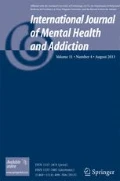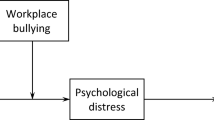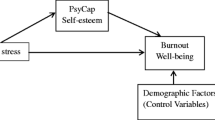Abstract
Rising terrorist attacks around the globe have seriously deteriorated individual quality of life in general and mental well-being in particular. By considering the negative impacts of terrorism and the resulting fear on employees’ mental health strain, this study has examined the relations among fear of terror (FOT), personal burnout (PB), and emotional intelligence (EI), mainly exploring whether EI moderated the association between FOT and PB. For this purpose, we have collected data from 413 employees’ in the education sector of Pakistan. These employees are working in different cities of the two most vulnerable and terrorism-affected provinces of Balochistan and Khyber-Pakhtunkhwa (KPK), Pakistan. Results of the hierarchical regression analysis revealed a significant positive relationship between FOT and PB, while EI significantly moderated the relationship between FOT and PB. Therefore, the positive association between FOT and PB was stronger for those participants who reported a low level of EI and weaker for those with high EI. The theoretical and practical implications of the study based on the findings were discussed. The key findings of the study show that EI could serve as a protective factor in the path from FOT to PB and improved individuals’ mental health by protecting them from burnout.

Similar content being viewed by others
References
Abbasi, N. M. (2013). Impact of terrorism on Pakistan. Strategic Studies, 33(2), 33–68.
Abiola, T., Udofia, O., Sheikh, T. L., & Yusuf, D. A. (2018). Fear of future terrorism: associated psychiatric burden. Asian Journal of Psychiatry, 38, 53–56. https://doi.org/10.1016/j.ajp.2017.01.028.
Asad Ali Shah, S., Yezhuang, T., Muhammad Shah, A., Khan Durrani, D., & Jamal Shah, S. (2018). Fear of terror and psychological well-being: the moderating role of emotional intelligence. International Journal of Environmental Research and Public Health, 15(11), 2554.
Bagozzi, R. P., & Yi, Y. (2012). Specification, evaluation, and interpretation of structural equation models. Journal of the Academy of Marketing Science, 40(1), 8–34.
Ben-David, S., & Cohen-Louck, K. (2010). Fear of terrorism: coping paradox and gender. In Transnational terrorism, organized crime and peace-building (pp. 66–80). London: Palgrave Macmillan.
Bleich, A., Gelkopf, M., Melamed, Y., & Solomon, Z. (2006). Mental health and resiliency following 44 months of terrorism: a survey of an Israeli national representative sample. BMC Medicine, 4(1), 21.
Canetti, D., Hall, B. J., Rapaport, C., & Wayne, C. (2013). Exposure to political violence and political extremism. European Psychologist, 18, 263–272.
Cejudo, J., Rodrigo-Ruiz, D., López-Delgado, M. L., & Losada, L. (2018). Emotional intelligence and its relationship with levels of social anxiety and stress in adolescents. International Journal of Environmental Research and Public Health, 15(6), 1073.
Cohen-Louck, K. (2019). Perception of the threat of terrorism. Journal of Interpersonal Violence, 34(5), 887–911.
Dahlin, M. E., & Runeson, B. (2007). Burnout and psychiatric morbidity among medical students entering clinical training: a three year prospective questionnaire and interview-based study. BMC Medical Education, 7(1), 6.
Davis, S. K. (2018). Emotional intelligence and attentional bias for threat-related emotion under stress. Scandinavian Journal of Psychology, 59(3), 328–339.
De Clercq, D., Haq, I. U., & Azeem, M. U. (2017). Perceived threats of terrorism and job performance: the roles of job-related anxiety and religiousness. Journal of Business Research, 78, 23–32.
Dilawar, S. M., Durrani, D. K., Li, X., & Anjum, M. A. (2019). Decision-making in highly stressful emergencies: the interactive effects of trait emotional intelligence. Current Psychology, 1–18. https://doi.org/10.1007/s12144-019-00231-y.
Espinoza, V., & Sanhueza, A. (2012). Fear of death and its relationship with emotional intelligence of nursing students in Concepción. Acta Paulista de Enfermagem, 25(4), 607–613. https://doi.org/10.1590/S0103-21002012000400020.
Extremera, N., & Rey, L. (2016). Ability emotional intelligence and life satisfaction: positive and negative affect as mediators. Personality & Individual Differences, 102, 98–101.
Fabio, A. D. (2015). Beyond fluid intelligence and personality traits in social support: the role of ability based emotional intelligence. Frontiers in Psychology, 6(395), 395.
Farzanegan, M. R., Krieger, T., & Meierrieks, D. (2017). Does terrorism reduce life satisfaction? Applied Economics Letters, 24(13), 893–896.
Fernández-Berrocal, P., & Extremera, N. (2016). Ability emotional intelligence, depression, and well-being. Emotion Review, 8(4), 311–315.
Fornell, C., & Larcker, D. F. (1981). Evaluating structural equation models with unobservable variables and measurement error. Journal of Marketing Research, 18, 39–50.
Galea, S., Ahern, J., Resnick, H., Kilpatrick, D., Bucuvalas, M., Gold, J., & Vlahov, D. (2002). Psychological sequelae of the September 11 terrorist attacks in New York City. New England Journal of Medicine, 346(13), 982–987.
Ganor, B. (2005). Terrorism as a strategy of psychological warfare. Journal of Aggression, Maltreatment & Trauma, 9(1–2), 33–43.
Görgens-Ekermans, G., & Brand, T. (2012). Emotional intelligence as a moderator in the stress-burnout relationship: a questionnaire study on nurses. Journal of Clinical Nursing, 21(15–16), 2275–2285.
Grant, A. M. (2007). Enhancing coaching skills and emotional intelligence through training. Industrial and Commercial Training, 39(5), 257–266.
Harman, H. H. (1976). Modern factor analysis. Chicago: University of Chicago Press.
Hayes, A. F. (2017). Introduction to mediation, moderation, and conditional process analysis: a regression-based approach. New York, NY: The Guilford press.
Herpertz, S., Schütz, A., & Nezlek, J. (2016). Enhancing emotion perception, a fundamental component of emotional intelligence: using multiple-group SEM to evaluate a training program. Personality and Individual Differences, 95, 11–19.
Hobfoll, S. E. (1989). Conservation of resources: a new attempt at conceptualizing stress. American Psychologist, 44(3), 513–524.
Hobfoll, S. E., Canetti-Nisim, D., & Johnson, R. J. (2006). Exposure to terrorism, stress-related mental health symptoms, and defensive coping among Jews and Arabs in Israel. Journal of Consulting and Clinical Psychology, 74(2), 207–218.
Human Rights Watch. (2017). “Dreams turned into nightmares” attacks on students, teachers, and schools in Pakistan. Retrieved from. https://www.hrw.org/news/2017/03/27/pakistan-attacks-schools-devastate-education. Accessed 15 Mar 2019.
Jacobi, M. (1991). Mentoring and undergraduate academic success: a literature review. Review of Educational Research, 61(4), 505–532.
Jhangiani, R. (2010). Psychological concomitants of the 11 September 2001 terrorist attacks: a review. Behavioral Sciences of Terrorism and Political Aggression, 2(1), 38–69.
Ju, C., Lan, J., Li, Y., Feng, W., & You, X. (2015). The mediating role of workplace social support on the relationship between trait emotional intelligence and teacher burnout. Teaching and Teacher Education, 51(S5), 58–67.
Kristensen, T. S., Borritz, M., Villadsen, E., & Christensen, K. B. (2005). The Copenhagen Burnout Inventory: a new tool for the assessment of burnout. Work and Stress, 19(3), 192–207.
Lian, P., Sun, Y., Ji, Z., Li, H., & Peng, J. (2014). Moving away from exhaustion: how core self-evaluations influence academic burnout. PLoS One, 9(1), e87152.
Liu, M., & Ren, S. (2018). Moderating effect of emotional intelligence on the relationship between rumination and anxiety. Current Psychology, 37(1), 272–279.
Marcoulides, G. A., & Schumacker, R. E. (2013). Advanced structural equation modeling: issues and techniques. Psychology Press.
Mattingly, V., & Kraiger, K. (2019). Can emotional intelligence be trained? A meta-analytical investigation. Human Resource Management Review, 29(2), 140–155.
Mérida-López, S., Extremera, N., & Rey, L. (2017). Emotion-regulation ability, role stress and teachers’ mental health. Occupational Medicine, 67(7), 540–545.
Mérida-López, S., Bakker, A. B., & Extremera, N. (2019). How does emotional intelligence help teachers to stay engaged? Cross-validation of a moderated mediation model. Personality and Individual Differences, 151, 109393. https://doi.org/10.1016/j.paid.2019.04.048.
Mikolajczak, M., & Luminet, O. (2008). Trait emotional intelligence and the cognitive appraisal of stressful events: an exploratory study. Personality and Individual Differences, 44(7), 1445–1453.
Mikolajczak, M., Nelis, D., Hansenne, M., & Quoidbach, J. (2008). If you can regulate sadness, you can probably regulate shame: associations between trait emotional intelligence, emotion regulation and coping efficiency across discrete emotions. Personality and Individual Differences, 44(6), 1356–1368.
Mikolajczak, M., Roy, E., Luminet, O., Fillée, C., & de Timary, P. (2007). The moderating impact of emotional intelligence on free cortisol responses to stress. Psychoneuroendocrinology, 32(8–10), 1000–1012.
Miville, M. L., Carlozzi, A. F., Gushue, G. V., Schara, S. L., & Ueda, M. (2006). Mental health counselor qualities for a diverse clientele: linking empathy, universal-diverse orientation, and emotional intelligence. Journal of Mental Health Counseling, 28(2), 151–165.
Murtagh, F., & Heck, A. (2012). Multivariate data analysis (Vol. 131). Springer Science & Business Media.
Odaci, H., Değerli, F. I., & Bolat, N. (2017). Emotional intelligence levels and counselling skills of prospective psychological counsellors. British Journal of Guidance and Counselling, 3, 1–10.
Ouyang, Z., Sang, J., Li, P., & Peng, J. (2015). Organizational justice and job insecurity as mediators of the effect of emotional intelligence on job satisfaction: a study from China ☆. Personality & Individual Differences, 76(76), 147–152.
Podsakoff, P. M., MacKenzie, S. B., Lee, J.-Y., & Podsakoff, N. P. (2003). Common method biases in behavioral research: a critical review of the literature and recommended remedies. Journal of Applied Psychology, 88(5), 879–903.
Pool, L. D., & Qualter, P. (2012). Improving emotional intelligence and emotional self-efficacy through a teaching intervention for university students. Learning and Individual Differences, 22(3), 306–312.
Puertas-Molero, P., Zurita-Ortega, F., Chacón-Cuberos, R., Martínez-Martínez, A., Castro-Sánchez, M., & González-Valero, G. (2018). An explanatory model of emotional intelligence and its association with stress, burnout syndrome, and non-verbal communication in the university teachers. Journal of Clinical Medicine, 7(12), 524.
Saka, Y., & Cohen-Louck, K. (2014). From demonization to identification: how parents who lost children in terrorist attacks perceive the attacker. Journal of Loss and Trauma, 19(2), 137–154.
Salovey, P., & Mayer, J. D. (1990). Emotional intelligence. Imagination, Cognition and Personality, 9(3), 185–211.
Schutte, N. S., Malouff, J. M., & Thorsteinsson, E. B. (2013). Increasing emotional intelligence through training: current status and future directions. International Journal of Emotional Education, 5(1), 56.
Shah, S. J., Zhang, L., Khan, S., Shah, S. A. A., Durrani, D. K., Ali, L., & Das, B. (2018). Terrorism vulnerability: organizations’ ambiguous expectations and employees’ conflicting priorities. International Journal of Occupational Safety and Ergonomics, 26(3), 562–572. https://doi.org/10.1080/10803548.2018.1486056.
Shahbaz, M., Shabbir, M. S., Malik, M. N., & Wolters, M. E. (2013). An analysis of a causal relationship between economic growth and terrorism in Pakistan. Economic Modelling, 35, 21–29.
Shead, J., Scott, H., & Rose, J. (2016). Investigating predictors and moderators of burnout in staff working in services for people with intellectual disabilities: the role of emotional intelligence, exposure to violence, and self-efficacy. International Journal of Developmental Disabilities, 62(4), 224–233.
Shieh, G. (2011). Clarifying the role of mean centring in multicollinearity of interaction effects. British Journal of Mathematical and Statistical Psychology, 64(3), 462–477.
Shirom, A., Toker, S., Shapira, I., Berliner, S., & Melamed, S. (2008). Exposure to and fear of terror as predictors of self-rated health among apparently healthy employees. British Journal of Health Psychology, 13(2), 257–271.
Sinclair, S. J., & Locicero, A. (2007). Fearing future terrorism: development, validation, and psychometric testing of the terrorism catastrophizing scale (TCS). Traumatology, 13(4), 75–90.
Sinclair, S. J., & LoCicero, A. (2009). Assessing the ongoing psychological impact of terrorism. In: Baer L., Blais M.A. (eds) Handbook of clinical rating scales and assessment in psychiatry and mental health. Current Clinical Psychiatry. Totowa: Humana Press. https://doi.org/10.1007/978-1-59745-387-5_13.
Solanky, P., Desai, B., Kavishwar, A., & Kantharia, S. L. (2012). Study of psychological stress among undergraduate medical students of government medical college, Surat. International Journal of Medical Science and Public Health, 1(2), 38–42.
Sonnentag, S., & Fritz, C. (2015). Recovery from job stress: the stressor-detachment model as an integrative framework. Journal of Organizational Behavior, 36(S1), S72–S103.
Stankov, L. (2018). Psychological processes common to social conservatism and terrorism. Personality & Individual Differences, 120, 75–80.
Svyantek, D. J., & Afzalur Rahim, M. (2002). Links between emotional intelligence and behavior in organizations: findings from empirical studies. The international journal of organizational analysis, 10(4), 299–301.
Szczygiel, D. D., & Mikolajczak, M. (2018). Emotional intelligence buffers the effects of negative emotions on job burnout in nursing. Frontiers in Psychology, 9, 2649.
Toker, S., Laurence, G. A., & Fried, Y. (2015). Fear of terror and increased job burnout over time: examining the mediating role of insomnia and the moderating role of work support. Journal of Organizational Behavior, 36(2), 272–291.
Van Fleet, E., & Van Fleet, D. (1998). Terrorism and the workplace: concepts and recommendations. Monographs in organizational behavior and industrial relations, 23, 165–202.
Van Rooy, D. L., & Viswesvaran, C. (2004). Emotional intelligence: a meta-analytic investigation of predictive validity and nomological net. Journal of Vocational Behavior, 65(1), 71–95.
Veness, S. D. (2017). Global trends in terrorism. Available online: http://georgetownsecuritystudiesreview.org/2017/02/24/gssr-special-issue-what-the-new-administration-needs-to-know-about-terrorism-and-counterterrorism/ (accessed on 31 July 2017).
VON KÄNEL, R., HERR, R. M., VAN VIANEN, A. E. M., & SCHMIDT, B. (2017). Association of adaptive and maladaptive narcissism with personal burnout: findings from a cross-sectional study. Industrial Health, 55(3), 233–242.
Wang, X., Cai, L., Qian, J., & Peng, J. (2014). Social support moderates stress effects on depression. International Journal of Mental Health Systems, 8(1), 1–5.
Wong, C.-S., & Law, K. S. (2002). The effects of leader and follower emotional intelligence on performance and attitude: an exploratory study. Leadership Quarterly, 13(3), 243–274.
Zhao, X., Huang, C., Li, X., Zhao, X., & Peng, J. (2015). Dispositional optimism, self-framing and medical decision-making. International Journal of Psychology, 50(2), 121–127.
Zhou, X., & Wu, X. (2016). The relationship between rumination, posttraumatic stress disorder, and posttraumatic growth among Chinese adolescents after earthquake: a longitudinal study. Journal of Affective Disorders, 193, 242–248.
Author information
Authors and Affiliations
Corresponding author
Ethics declarations
Conflict of Interest
The authors declare that they have no conflict of interest.
Ethical Approval
All research procedures performed in this study was under the ethical standards of the institutional research committee and in line with the Helsinki Declaration of 1964 and its later amendments.
Informed Consent
Informed consent was obtained from all individual participants included in the study.
Additional information
Publisher’s Note
Springer Nature remains neutral with regard to jurisdictional claims in published maps and institutional affiliations.
Rights and permissions
About this article
Cite this article
Shah, S.A.A., Yezhuang, T., Shah, A.M. et al. The Effectiveness of Emotional Intelligence in the Face of Terrorism Fear and Employees’ Mental Health Strain. Int J Ment Health Addiction 20, 1259–1272 (2022). https://doi.org/10.1007/s11469-020-00440-8
Accepted:
Published:
Issue Date:
DOI: https://doi.org/10.1007/s11469-020-00440-8




